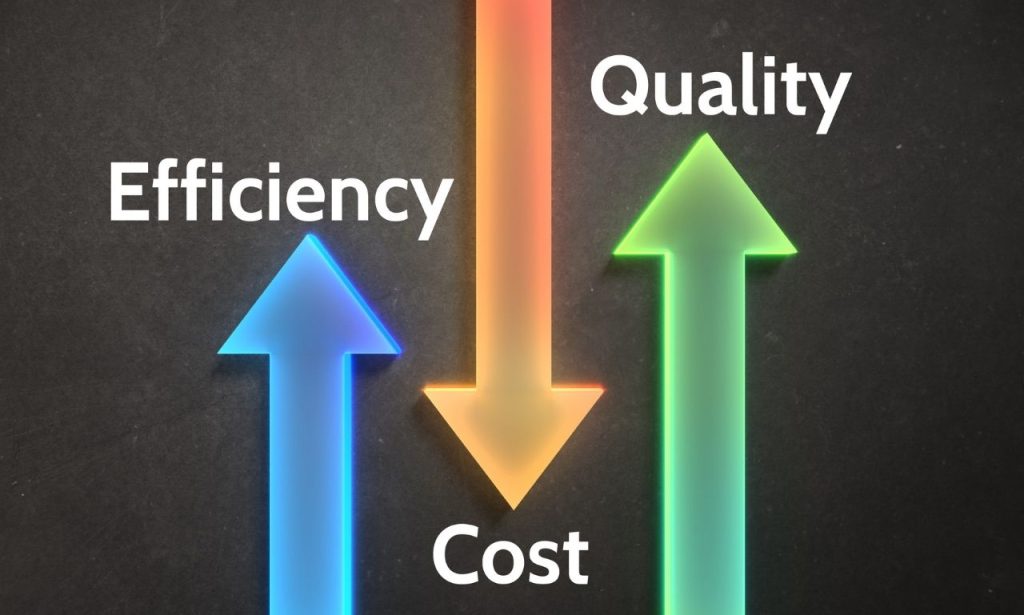Property management has changed a lot in recent years. New tech keeps pushing what’s possible in this field. AI leads this change, ready to transform how properties get managed. Old ways of managing properties don’t work as well anymore. Property managers now hunt for new solutions to stay ahead of competitors.
Property management companies today face tough challenges. They handle maintenance calls, talk with tenants, and track money all at once. This juggling act often creates waste and missed chances. AI offers a way to make these jobs easier and get better results. It’s not just about doing less work—it’s about working smarter.
Property management creates tons of data every day. This data holds secrets that humans often miss. AI spots these patterns and suggests what to do next. These tips help property managers make quick, smart choices. Better service and more profit follow naturally.
Opportunities of AI in Property Management

AI creates new chances in property management. It turns boring jobs into valuable assets. Property managers can grow their business while AI handles the grunt work. This team-up between people and machines gets amazing results.
Maintenance and Repairs
Maintenance problems give property managers constant headaches. They often find out about issues after damage happens. This after-the-fact approach wastes money and time. It also makes tenants mad when they wait too long for fixes.
Predictive maintenance stands out as one of AI’s best uses. This method uses sensors and data to guess when equipment might break down. Smart systems notice unusual water use that might mean leaks. They catch electrical problems before they cause outages. These early warnings let property managers fix things before they break completely.
AI doesn’t just predict problems—it also plans repair work better. The system checks who’s available and ranks urgent calls first. It sends the right repair person based on location and skills. This planning cuts downtime and makes tenants much happier.
Some property companies already use AI for maintenance tasks. These early users report fewer emergency calls and lower repair costs. Their tenants stay longer because problems get fixed before becoming big issues. Buildings last longer through better care.
Property Marketing and Leasing
Finding good tenants quickly remains a major challenge. Empty units mean lost money that never comes back. Old marketing methods often target too many or too few people. They waste effort on folks who won’t qualify or miss perfect matches.
AI changes property marketing through custom targeting. It studies market trends and tenant profiles at the same time. It finds which features appeal to specific groups of people. This knowledge helps create ads that speak to the right audience.
Virtual tours powered by AI save time for everyone involved. These tours let possible tenants check out properties from home. The AI shows features based on what that person likes. It answers questions right away without human help. This easy access brings in more qualified leads.
The screening process gets better with AI checking applicant data. The system verifies info across many sources fast. It flags concerns while following fair housing rules. This careful checking reduces the risk of problem tenants. It also speeds up approval for good applicants.
Lease talks become more strategic with AI insights. The system suggests the best pricing based on current market stats. It recommends lease terms that fill more units and increase income. These data-backed approaches remove guesswork from big choices. Property managers can talk with confidence, knowing the facts support them.
Enhancing Tenant Experience
Happy tenants renew leases and tell friends about you. They cause fewer problems and help create a good community. Making tenants happy used to take lots of staff time. AI now offers ways to improve tenant life efficiently.
AI assistants provide instant answers to tenant questions. They handle common questions about leases, features, or maintenance. These assistants work all day and night without breaks. Tenants love getting quick answers no matter when they ask.
Personal communication makes tenants much happier. AI tracks what people like and their past contacts to customize messages. It reminds tenants about events they might enjoy. It suggests amenities that fit their lifestyle. These small touches make tenants feel valued without extra staff work.
Smart home features run by AI make daily life better. Residents can change temperature settings from their phone. They get package notices instantly. Some systems even learn what residents prefer over time. Homes become more comfortable without extra effort.
Building community happens better with AI help. The tech finds shared interests among residents. It suggests events that specific groups might enjoy. These connections create belonging that leads to renewed leases. People stay longer in places where they feel connected.
Optimizing Operations

Behind the scenes, property management involves complex tasks. Accounting, reports, and legal compliance need precision. These office tasks eat up time that could go toward growth. AI streamlines these jobs significantly.
Money management improves with AI looking at income and costs. The system spots spending patterns and finds possible savings. It predicts cash flow based on past data and current trends. These insights help property managers make smarter money choices. They can use resources better and increase profit.
Staff scheduling works better with AI help. The system predicts busy times based on past patterns. It suggests the right staffing levels for different times. This smart approach prevents both understaffing and overstaffing. Property teams work more productively with the right resources.
Compliance checking happens automatically with AI systems. The tech tracks changing rules across different areas. It flags possible compliance issues before they cause problems. This proactive approach cuts legal risks and related costs. Property managers worry less knowing they stay compliant.
Energy management shows another area where AI creates value. Smart systems can optimize heating, cooling, and lighting use. They cut waste while keeping tenants comfortable. The resulting savings help both property owners and residents. Being green becomes easier through technology.
Challenges of AI in Property Management
Despite its benefits, AI brings certain challenges to property management. Understanding these hurdles helps companies use technology successfully. They can create plans to address possible problems early. This planning leads to better results and fewer surprises.
Data Privacy and Security
Property companies handle sensitive tenant info daily. This data includes financial records, personal ID, and security details. Protecting this information remains crucial. AI systems that access this data create possible weak spots.
Security measures must grow alongside AI abilities. Multi-factor login prevents unauthorized access to sensitive systems. Encryption protects data during transmission and storage. Regular security checks find and fix possible weaknesses. These practices create layers of protection.
Privacy regulations differ across locations and jurisdictions. Property companies must navigate these complex rules carefully. AI systems need programming to follow local laws automatically. This compliance requires ongoing attention. Mistakes carry serious legal and financial risks.
Tenant concerns about privacy deserve respect. People want to know how their information gets used and protected. Clear talk about data practices builds needed trust. Property managers should explain AI benefits while addressing privacy measures. This openness helps overcome resistance to new technology.
Cost and Complexity
Setting up AI systems requires significant upfront money. The software, hardware, and integration expenses add up fast. Many property companies operate with thin profit margins already. They must carefully figure out the potential return on their tech investments.
Staff training creates another major expense. Team members need to learn how to work with AI effectively. This learning curve varies based on system complexity. Property managers should budget for ongoing education. The human element remains essential for successful implementation.
System upkeep creates additional costs over time. Software updates, hardware replacements, and tech support add up. Property companies need reliable partners for this ongoing work. They should consider these expenses when calculating the total ownership cost. Long-term finances matter as much as initial expenses.
Implementing existing systems presents technical difficulties. Various property companies operate with multiple software platforms in their systems. Multiple systems need proper coordination to achieve functionality through deliberate organizational measures. Creating specific integration requires enhanced complexity and additional expenses. Property managers need to find solutions that operate within their existing technological framework.
Lack of Human Interaction

Some parts of property management benefit from personal connection. Property staff members build favorable relationships with tenants who live in their properties. Humans value the emotional support and understanding other humans provide as a natural part of their interactions. AI systems cannot fully substitute the human qualities that humans possess naturally.
Property managers need to determine the correct balance between letting automation do the work and having human interaction. All essential talks need to be handled by human operators. Americans still need human sensitivity during situations demanding empathy and discerning judgment. Property managers need to detect critical moments to establish appropriate operational procedures. Modern technology should strengthen human relationships instead of eliminating their essence.
The process of building trust functions differently when automated systems interact with people. Tenants might question AI-generated information. Tenants prefer to deal with people when important matters require verification. Property teams need to show respect for tenants’ preferences regarding human interactions. The property team should provide human assistance when specific situations demand it.
Emerging Trends in AI and Property Management
Predictive Analytics
Property management transforms into something new through data-based decisions, as analysts who perform predictive analytics extract accurate future projections from past information. These predictions help organizations manage their operations and implement daily management tasks.
Benefits of AI in Property Management
AI delivers advantages that benefit every operational area of property management. These advantages create favorable conditions for adopting new technology. The benefits produce measurable increases in operational performance and profit outcomes. Property companies’ primary advantage stems from their gained competitive advantages.
Conclusion
Property management needs AI to advance into the future. The technology delivers complete transformation to every operational element in this complex business model. Forward-thinking companies genuinely welcome these changes to their operations. The advantages of innovation help companies stay ahead in their market competition.
Property companies must perform specific implementation planning before proceeding with AI deployment. Property companies need to establish precise targets and performance standards before their implementation. Professional services companies must select partners with expertise in their particular industry. The strategic method optimizes both positive results and decreases operational interruptions.
Technology has advanced, but human expertise continues to be crucial. Organizations that achieve the highest success with property management integrate expert human resources alongside AI technology. Technology serves them for both efficiency and consistency. Human beings must handle intricate choices and social connections because technology cannot substitute their abilities.
Also Read: How AI is Transforming Real Estate
FAQs
Initial investments range from $5,000 to $50,000 depending on property size and needs.
No, AI works best alongside humans who handle complex issues requiring judgment and empathy.
Most companies complete basic implementation within 3-6 months with full integration taking up to a year.
Larger multi-family and commercial properties see the greatest ROI due to scale efficiencies.
Most tenants appreciate faster service and 24/7 availability while still valuing human interaction for complex matters.
